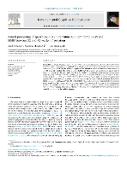Neural processing of speech sounds at premature and term birth: ERPs and MMR between 32 and 42 weeks of gestation

Datum vydání
2024Publikováno v
Developmental Cognitive NeuroscienceRočník / Číslo vydání
70 (DEC)ISBN / ISSN
ISSN: 1878-9293ISBN / ISSN
eISSN: 1878-9307Metadata
Zobrazit celý záznamTato publikace má vydavatelskou verzi s DOI 10.1016/j.dcn.2024.101444
Abstrakt
Prenatal listening experience reportedly modulates how humans process speech at birth, but little is known about how speech perception develops throughout the perinatal period. The present experiment assessed the neural event-related potentials (ERP) and mismatch responses (MMR) to native vowels in 99 neonates born between 32 and 42 weeks of gestation. The vowels elicited reliable ERPs in newborns whose gestational age at time of experiment was at least 36 weeks and 1 day (36 + 1). The ERPs reflected spectral distinctions between vowel onsets from age 36 weeks + 6 days and durational distinctions at vowel offsets from age 37 weeks + 6 days. Starting at age 40 + 4, there was evidence of neural discrimination of vowel length, indexed by a negative MMR response. The present findings extend our understanding of the earliest stages of speech perception development in that they pinpoint the ages at which the cortex reliably responds to the phonetic characteristics of individual speech sounds and discriminates a native phoneme contrast. The age at which the brain reliably differentiates vowel onsets coincides with what is considered term age in many countries (37 weeks + 0 days of gestational age). Future studies should investigate to what extent the perinatal maturation of the cortical responses to speech sounds is modulated by the ambient language.
Klíčová slova
Event-related potentials, Mismatch response, Newborn speech perception, Perinatal development, Premature birth, Vowels
Trvalý odkaz
https://hdl.handle.net/20.500.14178/2716Licence
Licence pro užití plného textu výsledku: Creative Commons Uveďte původ 4.0 International







